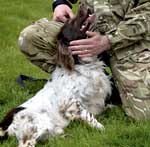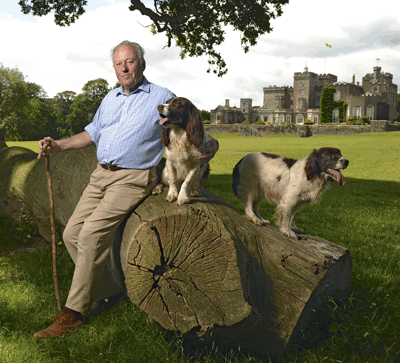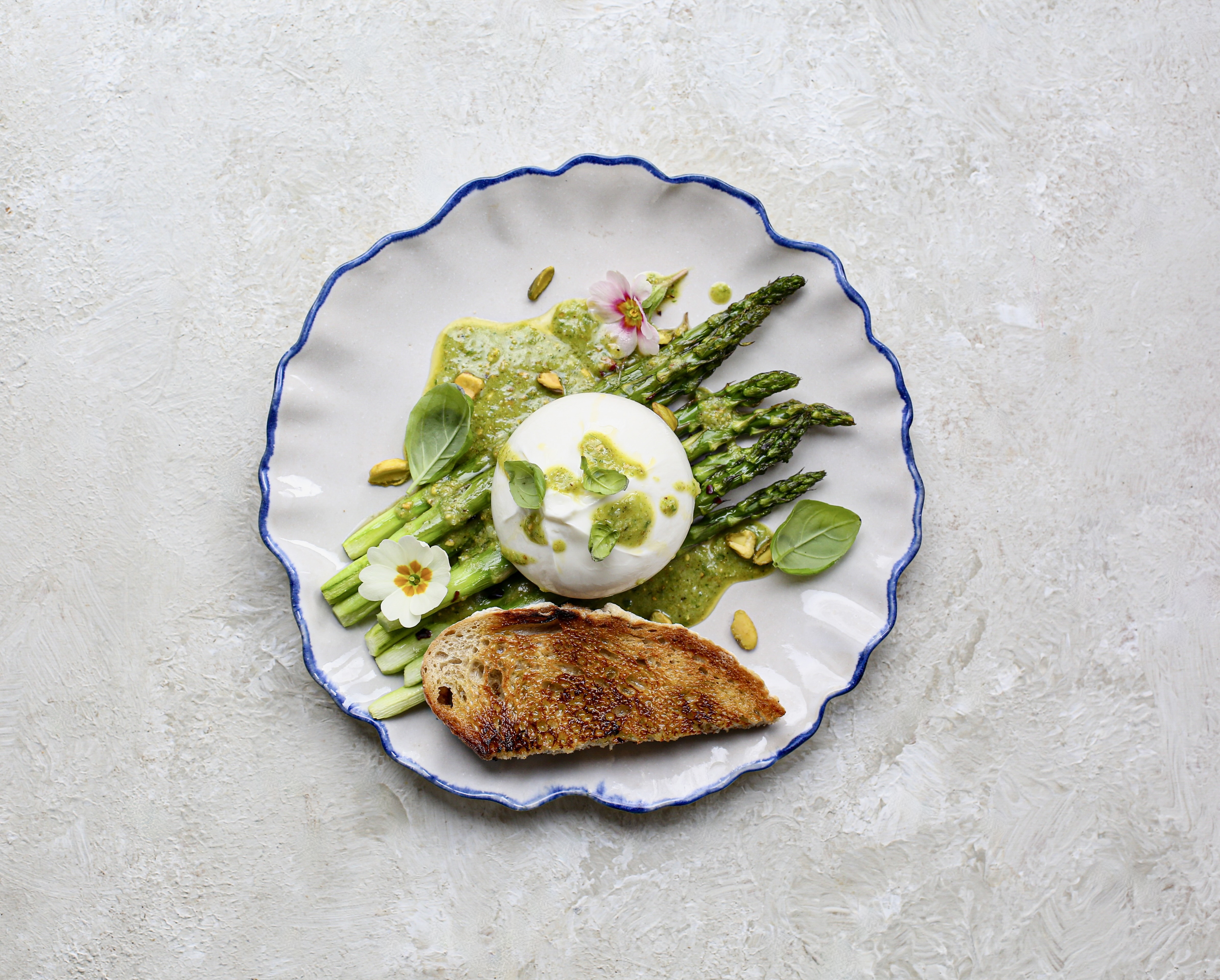Springer spaniels: Simply the best
Are spaniels the best dog breed? Country Life investigates


Sporty extrovert with floppy ears seeks fun-loving person for good times.' If dogs sought owners through dating websites, English springer spaniels would be inundated with replies. They're consistently popular: according to The Kennel Club (KC), the breed has notched up the third-highest number of registrations for the past nine years. This is because they're not only energetic and intelligent in the field, but they also make devoted, generous family pets.
Spaniels have been around for hundreds of years, but in the 19th century, they began to be used for different purposes according to size: the smaller pups from a litter would be trained to hunt woodcock and the larger ones (the precursors of modern springers) were used to flush game. English springer spaniels received official recognition from the KC in 1902, and they've been prized for their athleticism and ability to think on their feet ever since.
This combination of physical and mental prowess isn't restricted to the field-the best dogs will happily display their talents on a quiet afternoon walk. And, unlike star sportsmen who turn out to be disappointingly dull over dinner, the springer is always alert, even if he mayhave a propensity to break china. ‘They're not the most immaculately behaved, but they're compelling-very tough outdoors and as soft as butter in the house,' says the Earl of Devon. A dyed-in-the-wool fan, he's been breeding them from the same line at the Powderham estate near Exeter since the early 1980s.
He currently owns 14-year-old Daisy, granddaughter of his original springer, Bramble, and Tansy, who came from the Orkneys. ‘Daisy's stone deaf and only has one eye, but she still goes for long walks, and only recently stopped jumping the garden wall, which is 4ft 6in high,' he enthuses. Lord Devon's two liver-and-white companions invariably accompany him on shoot days and, over the years, he's witnessed some sen-sational retrieves. One of the most spectacular was executed by Dashel (that's Devonian for thistle-all the Powderham springers are named after weeds).
‘We were on a hill overlooking the Exminster marshes,' Lord Devon recalls. ‘I shot a hen pheasant and wounded it, and it disappeared out into the marsh, so I sent Dashel after it. There was some floodwater in her path, so she ended up downwind of the pheasant. She worked her way to it, whereupon it took off, but instead of tearing away, Dashel sat still, watched where it went and, after it landed, she went after it, collected it and brought it back to me. It was all witnessed by the beaters-very satisfying when there's an audience.'
Christelle Durrant, whose husband, Dick, is Lord Devon's head gamekeeper at Powderham, admits that although she's always had a soft spot for terriers, springers are her ‘guilty pleasure', adding: ‘They've been like friends to me since I was a child, as my Dad had a series of them.' She has a ‘team of four' (Tara, Ruby, Stripe and Tatiana) and has bred several puppies that will be in the line or picking up next season. ‘You feel naked on a shoot without them,' she explains. ‘They're so busy when you need to be busy.'
However, although Mrs Durrant's springers are working dogs, she cheerfully admits that they've taken over her life. She takes them eventing with her and frequently sneaks them into the house-something to which her husband has reluc-tantly acquiesced. ‘I think he knows that I'd just go outside to be with them if they weren't indoors. When I was a child, Mum used to put me in the kennel with our spaniels-it was like my playpen!'
Sign up for the Country Life Newsletter
Exquisite houses, the beauty of Nature, and how to get the most from your life, straight to your inbox.

David Lisett, who has trained gundogs for the Duke of Buccleuch for almost a decade, could fill a book with praise for springer spaniels. Although he also works with labradors and cockers, you can sense where his heart belongs. ‘When I start thinking about the job springers have to do, I find myself wondering how they pull it off,' he comments. ‘Say it's a rough day, walking up game. You let your dog off, you want him to start questing for game. Once he's found it, he needs to be steady to the flush [avoid catching the bird before it takes off] as it takes flight, and the gun shoots it.
Then, if the bird is wounded, the dog needs to take a line on it and catch it. So you're going from telling him "don't catch it, don't chase it" to "chase it and catch it".' Mr Lisett came to the Buccleuch estate with his own springers, whose bloodlines he'd carefully researched in order to maximise the chances of the dogs being a good fit for his training methods. For someone who's enjoyed a lot of success in the field-trials world, the springer spaniels' mentality is an absolute gift. ‘They have huge amounts of natural ability and are full of energy, so they're very easy to train,' he explains. ‘If you make a mistake, they usually forget about it straight away, because they're so eager to get on with the next thing.'
One of his most talented springers is the bitch Int.FTCh Annickview Breeze: ‘Her action towards questing and finding game is brilliant, but almost suicidal. You can't train that, it's in the dog.' Wiltshire landowner Erskine Guinness has a mother and daughter, Maggie and Bridget. ‘They're unbelievably rewarding, so quick and intelligent,' he enthuses. They can, however, be something of a challenge on a grand shoot. ‘I usually have the two with me, so I have to tie them to an electric fence post and keep my foot on it. They're rather wonderful for rough shooting, although Maggie often finds the bird and then Bridget takes it away from her, so that she can get the credit.'
In Norfolk, several springers are regarded as honorary members of the Royal West Norfolk Golf Club. Simon Hardy owns another mother-and-daughter duo, Divot and Jigger. ‘A good retrieve does perk up a round of golf,' he confides. ‘All the club's springers are related, and they have a lovely time on the course-particularly if they come across a pink-footed goose that's been winged on the marsh or a cormorant dying of old age.'
Springers and labradors are often compared, and devotees tend to fall into separate camps, but for springer aficionados, it's the dogs' boundless energy and sense of adventure that win the day. ‘Maggie is amazingly fast. She'll pick up a dozen birds in the time it takes for a labrador to pick up one,' Mr Guinness observes. Mr Lisett concurs: ‘To see a labrador perform, you need to be shooting something, but day-to-day life with a springer is always action-packed.'
* Subscribe to Country Life from just £51
* Follow Country Life magazine on Twitter
Country Life is unlike any other magazine: the only glossy weekly on the newsstand and the only magazine that has been guest-edited by HRH The King not once, but twice. It is a celebration of modern rural life and all its diverse joys and pleasures — that was first published in Queen Victoria's Diamond Jubilee year. Our eclectic mixture of witty and informative content — from the most up-to-date property news and commentary and a coveted glimpse inside some of the UK's best houses and gardens, to gardening, the arts and interior design, written by experts in their field — still cannot be found in print or online, anywhere else.
-
 Two quick and easy seasonal asparagus recipes to try this Easter Weekend
Two quick and easy seasonal asparagus recipes to try this Easter WeekendAsparagus has royal roots — it was once a favourite of Madame de Pompadour.
By Melanie Johnson
-
 Sip tea and laugh at your neighbours in this seaside Norfolk home with a watchtower
Sip tea and laugh at your neighbours in this seaside Norfolk home with a watchtowerOn Cliff Hill in Gorleston, one home is taller than all the others. It could be yours.
By James Fisher